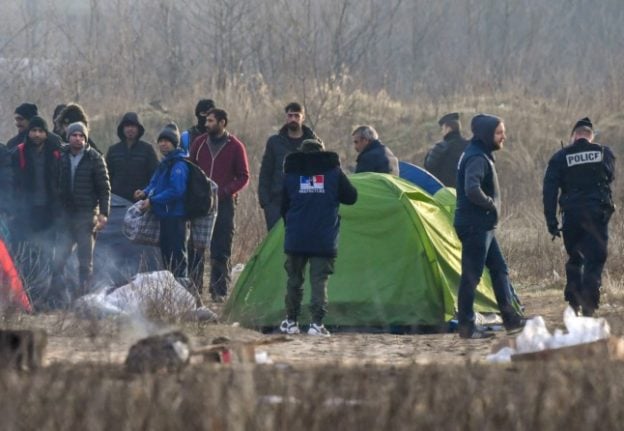CALAIS
Migrant children leave France’s ‘Jungle’ camp for UK
A first group of unaccompanied migrant children left the Calais "Jungle" camp for Britain on Saturday, days after a French minister said the UK had a "moral duty" to take them in.
Published: 16 October 2016 09:02 CEST

Migrants at the Calais "Jungle" protesting on October 13. Photo: Denis Charlet/AFP
The Calais prefecture confirmed that around two dozen unaccompanied minors were bound for a new life in Britain, where they had family members, although it added that there was no “no deal for a larger-scale plan” evacuation of children.
“Five Syrian minors and one Afghan minor have just been transferred to the United Kingdom. From Monday, around 10 more minors will follow, then on Tuesday, about 10 more,” a spokesman told AFP.
The children have been living in squalid conditions in the Calais encampment where charities estimate up to 10,000 migrants from Africa, the Middle East and Asia have settled in the hope of reaching Britain. The camp faces demolition.
The departure comes after French Interior Minister Bernard Cazeneuve on Monday said he was asking “Britain to assume its moral duty” by accepting unaccompanied children with family in the UK.
The British Red Cross has said 178 unaccompanied children in the camp have already been identified as having the right to claim asylum in Britain due to their family links.
In a statement to parliament Monday, Home Secretary Amber Rudd insisted that Britain was ready to cooperate with France on the issue but that an agreement had not yet been reached.
She added: “The primary responsibility (for the children involved)… lies with the French authorities. The UK government has no authority in France.”
However, she said Britain was keen to bring as many eligible children over to Britain before the “Jungle” site was dismantled, adding that London would move within “days, a week at most”.
Saturday also saw the start of construction on a new wall designed to block migrant access to the Calais port, a magnet for would-be stowaways who target UK-bound lorries.
The first four-metre (13-feet) high concrete panels in the so-called “anti-intrusion” wall were moved into place, according to an AFP reporter at the scene.
When complete, the wall will stretch for around a kilometre (0.6 miles) and add to some 30 kilometres of existing wire fences along the road leading to the port.
“Work is being undertaken on schedule and should be finished by the year's end,” said the Calais prefecture spokesman of the 2.7 million euros ($3 million) structure, which Britain has agreed to finance.
The “Jungle” has become a symbol of the Europe's biggest migrant crisis since the World War II and a major source of Anglo-French tensions, leading President Francois Hollande to demand that the site be demolished before the end of 2016.
The French government has yet to give an official date for dismantling the camp. Initial indications that it might happen as early as this Tuesday, however, proved premature and the plan has been put back at least a week, sources indicated.
Meanwhile work has been stepped up on the creation of reception centres across France to house as many as 9,000 people from Calais. In a further development Saturday, 50 lawyers arrived at the camp to provide the migrants with advice so they could fill in forms and be “aware of and assert their rights”, Flor Tercero, head of an association of lawyers for foreigners' rights, told AFP.
“We are well aware that the 'Jungle' is a place where living conditions are undignified and inhuman and that cannot go on,” Tercero said.
Away from Calais, a French fishing boat earlier Saturday came to the aid of four migrants who ran into difficulties in the English Channel as they made for England in a makeshift vessel, local authorities said. The fishing boat rescued the group, all four of whom were suffering from hypothermia, and handed them over to police.
Url copied to clipboard!


 Please whitelist us to continue reading.
Please whitelist us to continue reading.